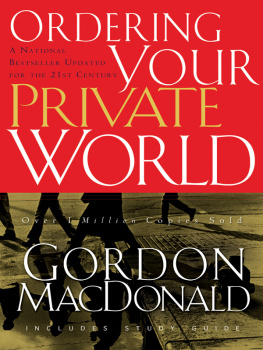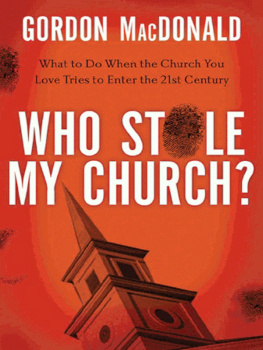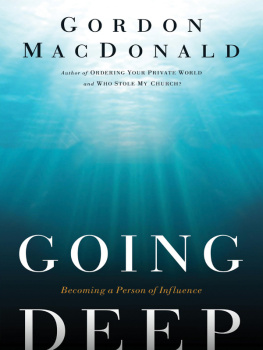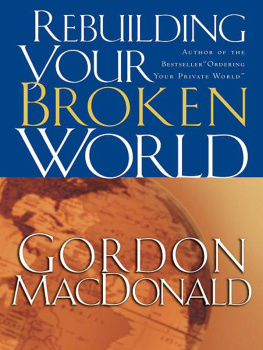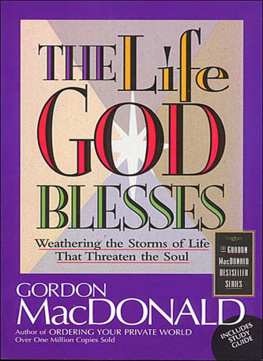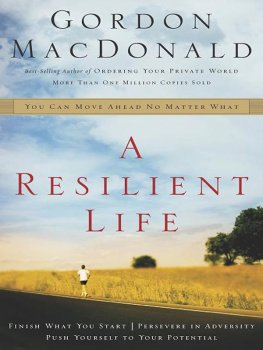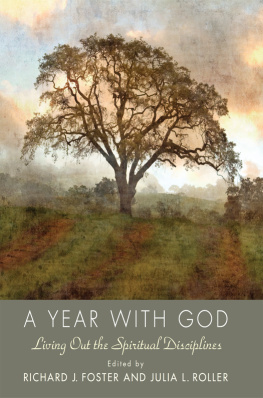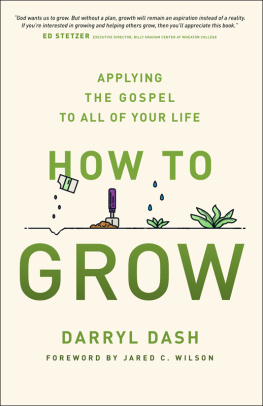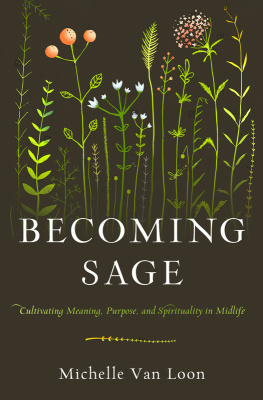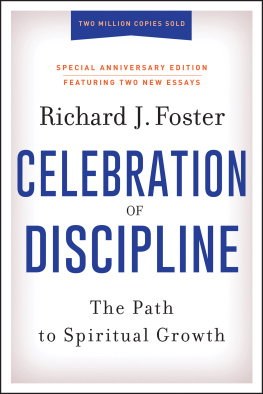ORDERING
YOUR
PRIVATE
WORLD
GORDON MACDONALD

Copyright 1984, 1985, 2003 by Gordon MacDonald
All rights reserved. No part of this book may be reproduced in any form without permission in writing from the publisher, except in the case of brief quotations embodied in critical articles or reviews.
Published in Nashville, Tennessee, by Thomas Nelson, Inc.
Unless otherwise indicated, all Scripture quotations are from the New American Standard Bible, Copyright The Lockman Foundation 1960, 1962, 1963, 1968, 1971, 1972, 1973, 1975, 1977, and 1995. Used by permission. www.Lockman.org
Scripture quotations marked TLB are from The Living Bible, copyright 1971. Used by permission of Tyndale House Publishers, Inc., Wheaton, Illinois 60189. All rights reserved.
Library of Congress Cataloging-in-Publication Data
MacDonald, Gordon, 1939
Ordering your private world / Gordon MacDonaldRev. ed.
p. cm.
Includes bibliographical references.
ISBN 0-7852-6381-0 (hardcover)
1. Christian life. I. Title.
BV4501.3 .M23 2003
248.4dc21
2002012547
Printed in the United States of America
03 04 05 06 07 BVG 5 4 3 2 1
CONTENTS
PREFACE
THE DAY I HIT THE WALL
O ne Saturday morning in my thirtieth year, an event occurred that changed my life.
I was a young pastor in a sizable church, and I had accumulated several weeks of busyness (I mean really busy!) in my work. Now, there is a busyness that reflects a plan of activity, a pattern of priorities, and a sense of purposefulness. It is a good and satisfying busyness through which one grows and increases competence.
But there is also a busyness (a destructive busyness, actually) that reflects a chaotic way of lifea way of doing in which one is simply responding to the next thing in the day. The next thing! It makes no difference whether or not it has significance; its just the next thing, and one does it because its there to do.
In that thirtieth year I was swept along in that second kind of busyness much like someone being swept along in the rapids of a raging river. Out of control. Fearful of capsizing. Feeling quite unprotected.
Day after day I had risen before the sun, and night after night I had fallen into bed long past the time when TV used to sign off. The hours of each day had been filled with business meetings, people with problems, speeches and talks that came one after another, andadded to all of thisthe normal administrative details that dog anyone who is in charge of an organization.
But that wasnt all. During that time there had been the deaths of two homeless men in our community. I had supervised the arrangements for their burials. The utter senselessness of their lives and the sadness of their lonely deaths had touched me deeply and sent me into a dark, cloudy mood.
Oh, there was also a book that everyone said I should be reading. Id purchased it and was reading snippets of it now and then. Its author seemed to attack everything I believed in and did it in such a convincing way that I felt the foundations of my entire belief system threatened. I couldnt get the book out of my thoughts.
All of itthe incessant work, that inky mood, those destabilizing thoughtshad done nothing but drain me: spiritually, emotionally, intellectually, and physically. Drained is certainly the operative word, and it was a surprising sensation because, like most young adults, I assumed that energy and vitality were boundless and inexhaustible. Im embarrassed to admit that I was unconsciously convinced that one could live at this furious pace forever and do it without any serious consequences.
And now, as I said at the beginning, it was Saturday, and I sat at our breakfast table trying to act in a sociable way toward my young family yet, all the while, preoccupied with the stuff that lay ahead of me in the next hours. At the top of my mental pile were the events of Sunday, twenty-four hours away, when I would have to stand before audiences on three separate occasions and give presentations for which, so far, I had done no preparation.
It was at that moment that my wife, Gail, spoke and said some thing that was both true and provocative. Youve not spent much time with the children lately, she observed quietly.
And I began to cry. Not a few tears and not for a short while. I cried for at least four hours... great, wrenching sobs that came from near, as best I can figure, the bottomless pit of my soul.
Gail, showing remarkable wisdom, asked a neighbor to watch our two children, and then held me in her arms while I blubbered my way through the morning. She was sensitive enough to know that I did not need someone to preach at me or offer a suck-it-up speech. She simply shared the cathartic moments with me and assured me of her (and Gods) love.
I remember the morning in considerable detail. It was as though my inner being was like a basement filled with floodwaters. But this was raw emotion and whatever was behind it. And like a flooded basement, it needed to be pumped out. Thus the wash of tears.
There were times on that Saturday morning when I thought I might be losing my mind. Was this what it was like to crack up, as some people put it? I was used to being in control, but now I was not. I was accustomed to being strong for everyone else, but now I was the weak one. What was happening? And why had no one ever warned me (at least in ways that I could understand) that there could be moments like this?
As a lecturer and writer, I have often told the story of that Saturday morning to men and women in leadership positions, and I have been careful (because I possess all the ego traits of men who do not like to bring attention to their tears) to tell them that this morning of crying had never happened before, nor has it happened since. But it certainly did that day, and I had no choice but to allow the days schedule to be killed and look to what had gone wrong inside me at soul-level.
Many times I have looked back wondering what I was crying for that day. Perhaps it was some of the wounds and sorrows that had been handed down from father to son from previous generations. Then again, perhaps I was weeping for my own sadnesses, the ones I had lived through as a boy and never brought to resolution. What about the possibility that I was simply reflecting weeks and weeks of stressful life in which there had been no pause and no inner, spiritual maintenance? How about the chance that it was all of these possibilities?
That Saturday was the day I learned, the hard and frightening way, that I could not go on living the way I was living and expect to be a spiritual leader (or any other kind of leader) of people. I often refer to that morning as the day I hit the wall.
I had always wanted to be a pastor. My father had been one, and my grandfather, for all practical purposes, had been one. The call to pastoral life was in my blood, you could say, and with great anticipation I pointed in that direction throughout my younger years. Even as a young boy I could see myself someday in the pulpit. When a teenager, even when I lived in a bit of spiritual defiance, I knew there would come a moment when I would capitulate to the call of God and become what he had made me to be: a pastor, a spiritual shepherd to people.
My father, an inveterate teacher, had taught me almost everything there was to know about how to lead a church. Words had come easily to me from the earliest days. So had social skills. I knew how to engage with people, think quickly on my feet, see issues and problems from the biggest possible perspective. By nature I was an idea man, a visionary of sorts, and I possessed an ability to persuade people to follow.
Next page
